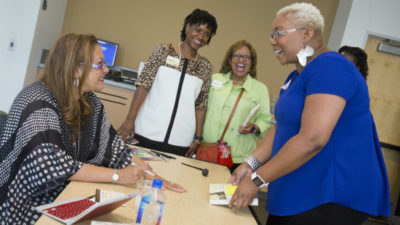The Race Card Project Tackles Difficult Topics
How do you start a conversation about a difficult topics? Perhaps by reducing your thoughts to six words.
Former National Public Radio host and journalist Michele Norris discussed “The Race Card Project,” created in 2010 to discuss race in the wake of the Obama Presidency at the 2016 Women of Color Leadership Conference at the University of Missouri-Kansas City.
Using 51/2” x 4 1/2” black postcards to get the conversation going, Norris shared them with everyone she encountered, whether on the street, at the store or in her NPR office in Washington, D.C.
“With this project, I wanted to figure out how to reach people with differing views,” said Norris. “This presented a great opportunity to spark conversations in real time.”
According to Norris, the limited content length demanded an “economy of words” and encouraged people to reduce their thoughts down to their essence.
Her conference theme, “Left Turns and Empty Seats at the Table,” raised questions that included “who might sit in the empty seat;” “at the intersection, which way are you going – right or left;” and “are you going to take your regular route or the direction that would take you out of your comfort zone?”
For most of her life, Norris took the safe path and wrote a syllabus each day as her guide, which ensured she would follow a certain familiar path. But questions kept nagging at her.
“How can I change and go left instead of right? Because of the empty seat, whose perspective am I missing?” Norris asked. “I spent a lot of time thinking and talking about race, but I didn’t want to be that person to cover the race beat at NPR.”
She didn’t want to be pigeonholed as the race reporter, so she spent two-thirds of her journalism career ‘not flying the flag regarding race.’
Norris took a leave from NPR in 2011 when her husband, Broderick Johnson, joined President Obama’s campaign for reelection. She left the network in December 2015 to devote her time to expanding The Race Card Project.
“A principal part of my portfolio allowed me to speak for people without a voice or for those without a seat at the table,” said Norris. “During the 2008 election term, Harvard Law School Professor Derek Bell introduced the term post-racial, after which she began to rethink her role in the discussion about race.
Norris said she wanted to get out to view America, to get a sense of the conversation about race and the belief we lived in a post-racial nation.
“The question that needed an answer: ‘Did we really believe matters of race were ending?’ ”
Norris asked her family questions while encouraging their participation in her project, and encouraged others to participate, as well. She said even though her family rarely discussed race, suddenly it was as if they had “historic indigestion” and wanted to share stories she had never heard about her family. In order to talk with others about their racial concerns and identity, she needed to know about her own family first.
One of the things she learned, which also is covered in her book, “The Grace of Silence: A Family Memoir,” was that her father was shot by a white police officer in Birmingham, Ala. Neither she nor her mom had ever heard about it. She searched newspapers, spoke with family members – many of whom knew about the shooting – and spoke with an officer who was aware of the shooting.
Also, Norris discovered that her grandmother was a travelling Aunt Jemima, working across Missouri with one other woman, promoting the famous pancake mix. Norris’ mother was ashamed of this part of their history and would not discuss it until finally sharing it with her granddaughter.
“My grandmother focused on the children who attended the shows, providing a positive image of African Americans, speaking the Kings English and hoping the memory would live in the children as adults,” said Norris. “My grandmother helped with our family history using the only stage available to her.”
Now in its sixth year, The Race Card Project provided great insight into race in America, according to Norris. Some comments were lighthearted and others were hard to read. Two of her favorites were “underneath we all taste like chicken” and “it costs less to adopt a black child in America than to adopt other children.”
The project provides a place for people to tell their story; it can create bridges to talk across differences; and it teaches the importance of being silent and listening to others. Norris encouraged participation with caution, including: expect discomfort; only when you leave your comfort zone can you grow; the truth is needed; there’s power in talking with someone with whom you disagree; and be optimistic because it has currency.
Norris ended her conference keynote lecture with this statement: “Live in the U.S., which says ‘us,’ all of us.”
Created to begin a candid conversation about race, the six-word postcard project has generated more than 50,000 comment cards thus far.
|Wandra Brooks Green, Division of Strategic Marketing and Communications

